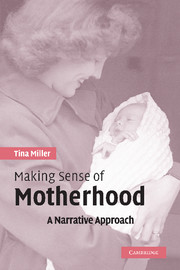Book contents
- Frontmatter
- Contents
- Dedication
- Acknowledgements
- Introduction
- 1 The storied human life: a narrative approach
- 2 Making sense of motherhood: cultural scripts
- 3 Setting the Western context: mothering in late-modern society
- 4 Anticipating motherhood: the antenatal period
- 5 Making sense of early mothering experiences
- 6 A return to normal: becoming the expert
- 7 Conclusions and reflections: making sense of motherhood
- References
- Index
1 - The storied human life: a narrative approach
Published online by Cambridge University Press: 22 September 2009
- Frontmatter
- Contents
- Dedication
- Acknowledgements
- Introduction
- 1 The storied human life: a narrative approach
- 2 Making sense of motherhood: cultural scripts
- 3 Setting the Western context: mothering in late-modern society
- 4 Anticipating motherhood: the antenatal period
- 5 Making sense of early mothering experiences
- 6 A return to normal: becoming the expert
- 7 Conclusions and reflections: making sense of motherhood
- References
- Index
Summary
I'm doing all the practical things of a mother. But it hasn't actually sunk in, it's like I'm living this part in a play and in fact I'm going through all of the motions, but is it actually reality and is this what motherhood is all about?
(Abigail, interviewed eight weeks after the birth of her first child)This book explores women's journeys into motherhood in late modernity. It brings together research carried out in the UK and fieldwork observations from Bangladesh and the Solomon Islands in order to illuminate women's experiences of becoming mothers and motherhood. In many Western societies patterns of reproduction discernible in previous generations, and practices associated with childbearing, have changed. Increasingly, if women choose to become mothers at all, they come to motherhood either much earlier in their lives as teenage mothers, or later once careers have been established, in partnerships or alone. These changes in timing and frequency of childbearing have been mirrored by changes in the meanings ascribed to, and women's experiences of, motherhood. Becoming a mother changes lives in all sorts of ways. It has major significance for individual biographies, yet expectations and experiences will be shaped by the social and cultural contexts in which women live their lives. Indeed there is some irony that women becoming mothers can experience their transition as confusingly uncertain and risky at a time when biomedical, expert knowledge has apparently provided greater scientific certainty than at any time before.
- Type
- Chapter
- Information
- Making Sense of MotherhoodA Narrative Approach, pp. 6 - 26Publisher: Cambridge University PressPrint publication year: 2005



